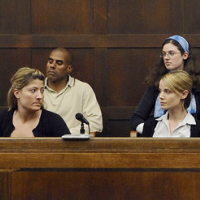Because Black Jurors are more likely to Acquit, Many Prosecutors Try to Exclude Them
 Jurors at trial (photo: CJ Gunther, AP)
Jurors at trial (photo: CJ Gunther, AP)
A new study (pdf) by an Australian human rights group says prosecutors in Louisiana are more likely to exclude blacks from juries because of their tendency to acquit defendants, often black ones.
The research findings were similar to those found by other studies of other southern states, including Alabama and North Carolina, as well as earlier studies in Louisiana.
The new study focused on cases in Caddo Parish, home of Shreveport, where prosecutors have had a habit of using peremptory challenges—the legal excuse for removing a potential juror—three times as often with blacks as others during the last decade.
Reprieve Australia, which produced the study of 300 cases from 2003 to 2012, called the rate “statistically significant.”
Researchers found no defendants were acquitted when juries had two or fewer blacks serving on them. But when juries had at least three black jurors, the acquittal rate was 12%. Juries with five or more blacks brought the rate up to 19%.
In all three of the groups, the defendants were overwhelmingly black.
“Caddo Parish is 48 percent black, and 83 percent of the defendants in the new study were black,” wrote Adam Liptak at The New York Times. “But the typical 12-member criminal jury had fewer than four blacks on it, the report said. Of the 8,318 potential jurors in the study, which reviewed 332 trials from 2003 to 2012, only 35 percent were black.”
Peremptory changes were not responsible for most of the gap. The reason for this, according to Liptak—citing an explanation from Shari S. Diamond, a jury expert at Northwestern University School of Law—is that “blacks may be less likely to be on jury lists that are drawn from voter registration records, less likely to appear when called, more likely to qualify for hardship exemptions and more likely to be disqualified for felony convictions.”
Nonetheless, peremptory challenges were used by Caddo Parish prosecutors against 46% of the remaining black potential jurors, and against only 15% of other potential jurors. A higher percentage of potential black jurors than non-black jurors were struck in 93% of the trials.
“Why do race-based peremptory challenges persist? Because race is an unfortunate but powerful basis for generalization,” wrote Gilad Edelman at The New Yorker. “To state the obvious, black people are more likely to have been targeted or abused by police; to be affected by the extreme racial disparities in arrests, incarceration, and the death penalty; and to understand that crimes against black victims are prosecuted less vigorously than those against whites. All things being equal, a prosecutor has reason to think that a black juror is less likely to side with the government against a black defendant than a white one.”
Elisabeth A. Semel, director of the death penalty clinic at the law school at the University of California, Berkeley, believes this clearly has an impact on the public at large. “If you repeatedly see all-white juries convict African-Americans, what does that do to public confidence in the criminal justice system?” she told the Times’ Liptak.
-Danny Biederman, Noel Brinkerhoff
To Learn More:
Exclusion of Blacks From Juries Raises Renewed Scrutiny (by Adam Liptak, New York Times)
Blackstrikes: A Study of the Racially Disparate Use of Peremptory Challenges by the Caddo Parish District Attorney’s Office (by Ursula Noye, Reprieve Australia)
Why Is It So Easy for Prosecutors to Strike Black Jurors? (by Gilad Edelman, New Yorker)
- Top Stories
- Unusual News
- Where is the Money Going?
- Controversies
- U.S. and the World
- Appointments and Resignations
- Latest News
- Trump Orders ICE and Border Patrol to Kill More Protestors
- Trump Renames National Football League National Trump League
- Trump to Stop Deportations If…
- Trump Denounces World Series
- What If China Invaded the United States?






Comments